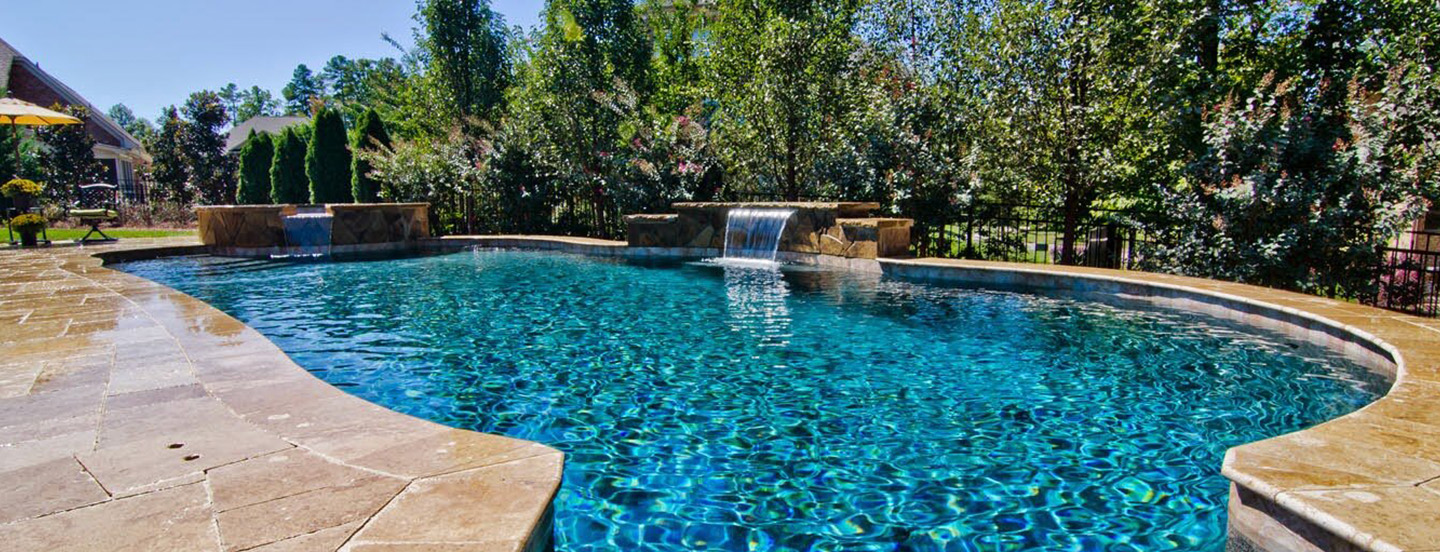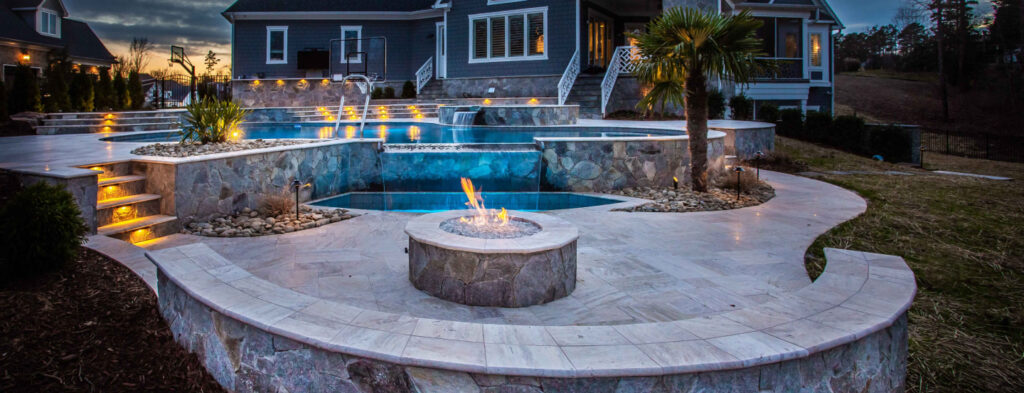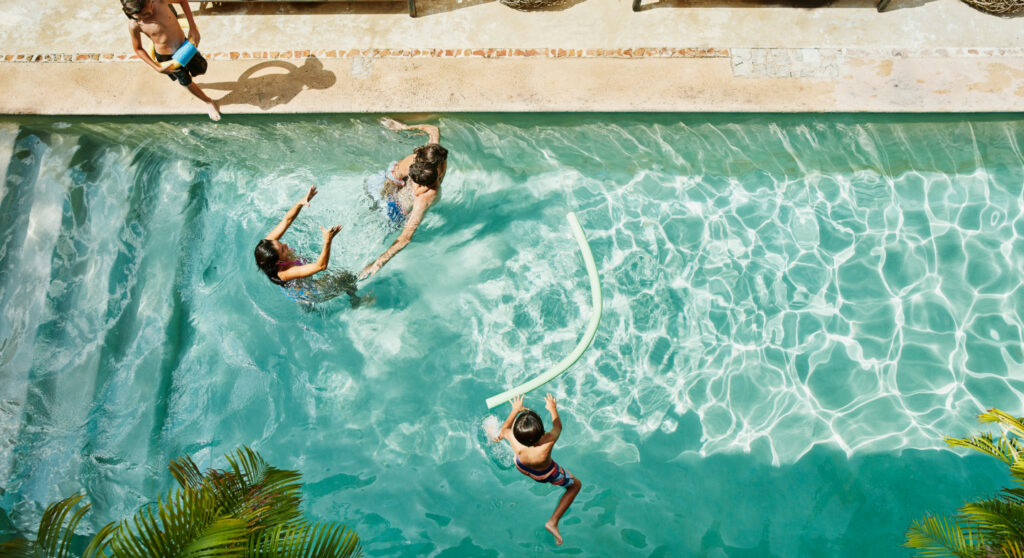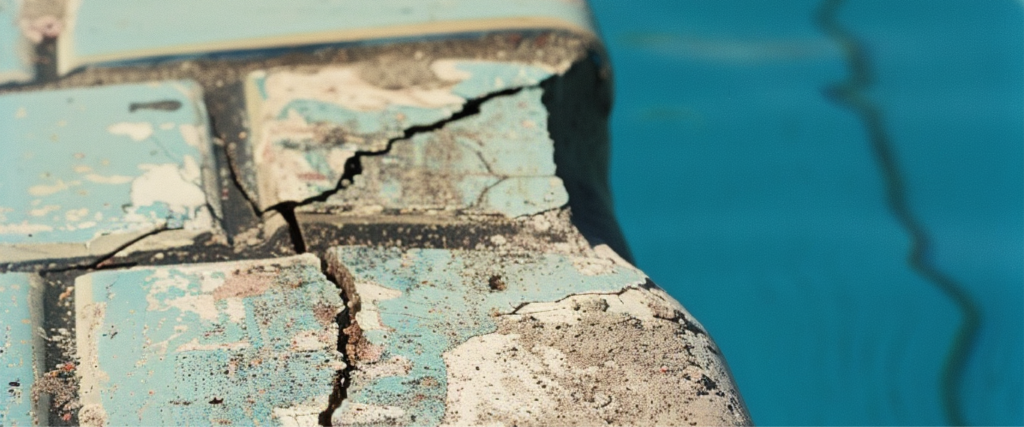When building a new pool, there are several factors that will affect how much you spend on installation and beyond.
1. Pool Type
When you choose to build a new pool, there are three main types you can choose from, each with its own pros and cons, depending on your vision and needs:
- Concrete: Concrete pools, also known as gunite pools, are the most customizable pool type and offer the best long-term durability, with an average lifespan of 50-100 years with proper maintenance.
- Fiberglass: Fiberglass pools are pre-made and transported to your home as a single shell, making them the fastest type of pool to install. However, they have a shorter lifespan of around 25 years and lack the customization options of concrete pools.
- Vinyl: Vinyl pools are made from plastic polymer or steel. While the cheapest material to work with, they offer the least durability of any pool type. Vinyl liners are prone to tearing and scratching, which means they wear down over time and need to be replaced every 10 years.
2. Pool Size and Depth
Typically, the larger and deeper your pool is, the more expensive it will be. Most inground pools are 12-by-28 feet in size with a depth of 5-8 feet at a cost between $50 and $125 per square foot. When you meet with an Anthony & Sylvan pool building professional, they’ll look at the space you have in your backyard and let you know which options are possible based on your preferences and local regulations.
3. Site Preparation
Your backyard terrain will factor into pool construction costs, as the builder will need to prepare the site prior to building the pool. Excavation costs may vary based on the size of the pool and soil conditions. For example, rocky or clay-rich soil might add to excavation costs because it’s harder to remove. Additionally, the builder will need to ensure the site is level, remove any trees, and relocate underground plumbing that’s in the way.
4. Pool Features
When building a new pool, you may be able to customize it with additional features that add to its aesthetic and functionality. Common pool features include hot tubs, lighting, waterfalls, jets, heaters, jump boards, and a beach entry, among others. You may also want to invest in safety features such as a pool cover and motion sensor alarms to protect the pool and users. These come at an additional cost, so you can choose which, if any, you want to include in your build.
5. Utilities
An empty pool doesn’t afford much fun, so you’ll need to fill it with water, which will add to its overall cost. Some pool companies like Anthony & Sylvan will pay for the water themselves, but otherwise, you can fill your pool with water from the city by using a garden hose connected to an exterior faucet, which will take between 12 and 72 hours. After filling it up, keep in mind that water will need to be cycled, which will use additional water and electricity. If you’ve opted for a saltwater pool, don’t forget to plan for the regular addition of salt bags to keep the system running smoothly.
6. Permits and Regulations
To build a pool in Philadelphia, you’ll need to obtain the proper permits and ensure your pool complies with local regulations. This will require a bit of research unless you’re working with a builder like Anthony & Sylvan Pools Philadelphia that will handle all of this for you to ensure compliance. Some of the key conditions that will impact your pool’s cost include:
- Permits: You’ll need a permit to build a pool, which can vary by county. Your builder should provide this estimate during the design phase, and some builders like Anthony & Sylvan will pay for permit fees.
- Fencing: You’ll need to have a fence around your pool and a gate that’s self-closing and self-latching, though specific requirements vary by area.
- Water Discharge: Before replacing the water in your pool, you’ll need to check your area’s rules regarding water disposal. You’ll need to dechlorinate the water prior to disposal and some areas require you to get a permit from your local government.
7. Taxes
A new pool will add to your home’s value, and thus may increase your property taxes. There are some cases where property taxes don’t go up, but it will depend on the type of pool you build and how your county assesses the addition. If you’re building a pool for medical reasons, you may be eligible for a tax deduction on the installation and long-term maintenance costs.
8. Insurance
Building a new pool will also increase your homeowner’s insurance by roughly $50 each year. Your homeowner’s insurance will cover damage to the pool and may also include accessories such as a pool liner. Additionally, the liability portion of your homeowner’s insurance will protect against medical bills or lawsuits resulting from accidents around the pool.
9. Maintenance
Long-term, you’ll need to pay for regular pool maintenance and repairs to keep it in good condition. All pools require cleaning and chemical treatments to maintain water clarity, but you’ll also need to account for other services that occur on a less frequent basis. Fiberglass pools don’t require much other than gel coat applications to repair scratches, but vinyl pools require new liners every 10 years and concrete pools need resurfacing every 8-20 years depending on the type of finish. You may also incur ad-hoc costs to repair tiles or equipment like the pool heater or filter.









